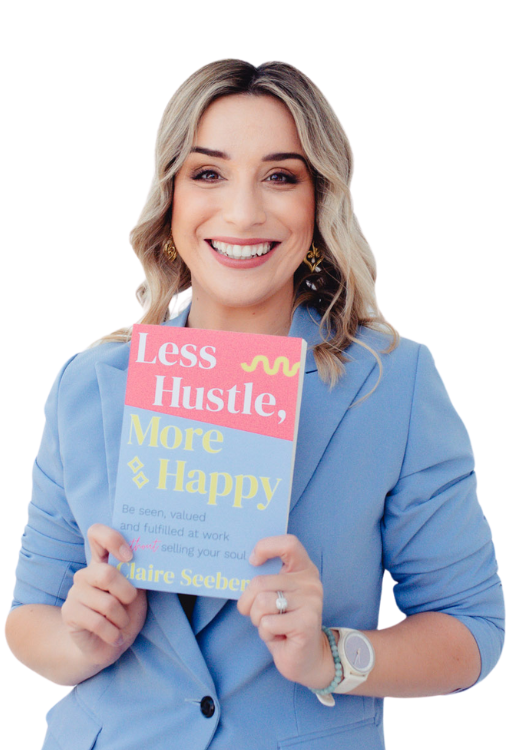Hi – my name is Claire, and I am a recovering overthinker. What does that mean? That means I have spent far too many years, thinking far too often and for far too long about what others thought of me. And the day I realised that none of that energy was worth it, was the day my life changed for the better.
Overthinkers are often hugely empathetic and passionate people. Sometimes this care and concern for others though and this insatiable desire to feel that we are doing good, or doing well can overtake the actual DOING of things. It can paralyse you and ensure that you invest more time dissecting conversations for what you said or didn’t say more so than the positive contribution/s that you actually made to the conversation. Overthinking can make you anxious, and it can stunt your ability to learn and grow, because you don’t see growth, you only see failure.
There are an endless number of books out there that will tell you how to ban overthinking forever, or a “5 step guide” to stop thinking about what others think of you forever. I call bullsh*t on that – and I can, because I am an overthinker, and I don’t believe it is something you can just “cure”. It is a part of you, and when understood and used in the right way it can be a strength instead of a weakness.
I was doing a coaching session last week with someone who wanted to “beat” overthinking and wanted to know what could they do to stop thinking. The truth is...... you can’t. But you CAN learn how to use your overthinking for good and not as a stress trigger. It is not the overthinking itself that causes stress or anxiety, it is what you are thinking about when you are overthinking.
I still catch myself from time to time caring about things I shouldn’t, people’s opinions of me that I shouldn’t, or whether I did or didn’t say something.
Now, when I catch myself though, these are the three things I ask myself:
Firstly, why am I thinking about this, and is it worth investing energy on it?
Secondly, will this thought or event be a blip on my radar in 6 months time?
And, thirdly, what REAL evidence do I have that either a) person "x" actually has the opinion of me that I think they do, or b) what REAL evidence do I have that my contribution to something was below par?
You might not be able to ever fully beat the overthinking drug, but you can control it and own it, instead of it owning you!
Here are some of the things that I have learnt about us overthinkers, as a recovering (but not recovered!) one:
We aren’t insecure freaks – we just think. And we think ALOT. We think about us, about you, what we said to you, what we said at that meeting (or didn't say). Is that why you haven’t replied to our email, or returned our phone call. Is that why my ears are burning. Like I said – we think. A lot.
Sometimes we care too much – and when we think we might have upset you (refer to point 1) again we feel really bad and we want to make it better. They key for us though is to learn that sometimes we are helping people more by telling them what they need to hear.
Sleep can be the hardest part of our day - particularly if point 1 and 2 are in play, it seems to be the time when all the day’s events decide to replay themselves.
With all the thinking that we do, we often come up with ideas and find solutions! Research has discovered that with all our overthinking, overthinkers can generate solutions to problems and create new ideas – the challenge is harnessing this thinking for positive and not negative!
You might not be an overthinker in all aspects of your life – sometimes people are only overthinkers in one segment of their life – i.e. work, friends, family etc depending on where their insecurities lay. You might find when with family or friends you are confident, clear and don’t overthink, yet switch to Monday in the office your brain goes into overdrive.
Overthinking has become an epidemic, and with the social media tap heavily flowing and constant communication and commentary not disappearing anytime we soon, we need to get stronger and more resilient at managing the reams of information that are thrown at us.
Are you an overthinker?? Here are 4 things you can adopt to help you get out of your own way (or head, in this instance), and invest your energy on things that count.
When you catch yourself overthinking, do the following:
- Write it down – journal what is going on in your head and get it out of there!
- Talk to someone – but make sure they are someone who will call you on your bulls*it if you go around in circles with your overthinking talk (we can do this!).
- Use positive distractions to stop yourself from thinking about things you don’t want to be thinking about. If you are lying awake in bed at night just hoping you will fall asleep, get up and do something else for a while, focus your energy on that, and then try again.
- Most importantly, ask yourself the 3 questions above to try and try to dissolve the thinking pattern.
If you are a fellow overthinking, or a recovering overthinker like me, I would love to hear from you! I am expanding my Eating your Cake too offering to include coaching specifically to support women in getting out of their own ways.
Interested in learning more? Hit me up at yo****@***************oo.com and lets have an obligation free initial chat to see if there is some synergy there.






